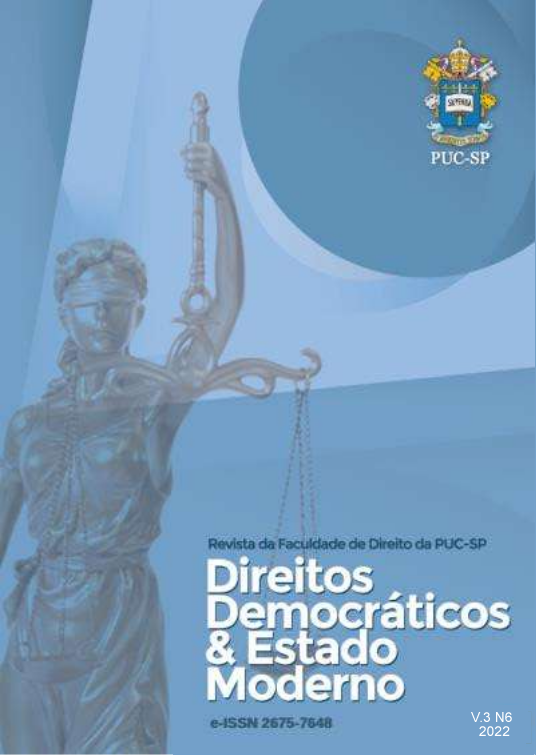Digtal state ant the judge code
the effectiveness of decision-making algorithms in the age of voluble fundamental rights
DOI:
https://doi.org/10.23925/ddem.v.3.n.6.59575Keywords:
liquid modernity, legal hermeneutics, fundamental rights, artificial intelligenceAbstract
The object of study of this work is to analyze automation movements in the practice of law from the perspective of legal hermeneutics in the era of Net Fundamental Rights. Therefore, applying a hypothetical-deductive methodology and an argumentative bibliographical review as a source of theoretical observation, it is expected to conclude whether the application of decisive algorithms in the digital age is effective in protecting contemporary human rights. Therefore, in the first chapter, the advance in the use of technology for the performance of cognitive activities was contextualized, as well as models that sought to standardize legal reasoning were approached. In the second, the legal hermeneutics was discussed based on the thinking of Kelsen, Dworkin, Habermas and Bobbio. In this third chapter, then, the question that guided the research will be dealt with, namely, on the (in)effectiveness of the use of algorithms in the practice of law in the light of legal hermeneutics, in particular in aiding argumentation and decision-making. decision. Thus, it is expected to highlight the difficulties of the rigid application of algorithms in judicial decision-making and the legal uncertainty of a decision taken by a source code, especially in a sociological and legal context in which Rights are increasingly liquid and unstable, while the analysis of Law is increasingly subjective and volatile.
References
BAUMAN, Zygmunt. Legisladores e Intérpretes: sobre modernidade, pós-modernidade e intelectuais. (trad. Renato Aguiar). Rio de Janeiro: Zahar, 2010
BAUMAN, Zygmunt. Globalização: as consequências humanas. Trad. Marcus Penchel. Rio de Janeiro: Jorge Zahar, 1999. Título original: Globalization: the human consequences.
BOBBIO, Norberto. O Positivismo Jurídico lições de filosofia do direito. Trad. Márcio Pugliesi. São Paulo: Ícone, 1995
BOYD, Danah. CRAWFORD, Kate. Six Provocations for Big Data. A Decade in Internet Time: Symposium on the Dynamics of the Internet and Society, 2011. Disponível em: https://papers.ssrn.com/sol3/papers.cfm?abstract_id=1926431. Acesso em: 11.10.2022.
CALSAMIGLIA, Albert. Postpositivismo. Doxa, 21, nº 1, 1998.
CAMPOLO, A.; SANFILIPPO, M.; WHITTAKER, M.; CRAWFORD, K. AI NOW 2017 Report, AI Now Institute. New York (2017). Disponível em: https://ainowinstitute.org/AI_Now_2017_Report.pdf. Acesso em: 113.10.2022.
CANOTILHO, J. J. Gomes. Direito constitucional e teoria da Constituição. Coimbra: Almedina, 1998.
Cf. FREY, Carl Benedikt; OSBORNE, Michael. The future of employment: how susceptible are jobs to computerisation? Oxford: Oxford Martin Programme on Technology and Employment, 2013, p. 3. Disponível em http://www.oxfordmartin.ox.ac.uk/publications/view/1314. Acesso em: 11.10.2022.
COMPARATO, Fábio Konder. A afirmação histórica dos direitos humanos. 2. ed. São Paulo: Saraiva, 2001.
DWORKIN, Ronald. Levando os Direitos a Sério. (trad. Nelson Boeira). 3. ed., São Paulo: Martins Fontes, 2010.
DOYLE, Nicholas J. Confirmation Bias and the Due Process of Inter Partes Review. IDEA: The Journal of the Franklin Pierce Center for Intellectual Property, v. 57, p. 29-70, 2016.
GADAMER, Hans-Georg. Verdade e método: fundamentos de uma hermenêutica filosófica. 7. ed. Trad. Enio Paulo Giachini. Petrópolis, Vozes, 2005.
GOODMAN, B.; FLAXMAN, S. R. (2017). European Union regulations on algorithmic decision-making and a “right to explanation”. AI Magazine, 38(3), p. 50-57.
HABERMAS, Jürgen. Direito e Democracia: entre faticidade e validade. v. 1. (trad. Flávio Beno Siebeneichler). Rio de Janeiro: Tempo Brasileiro, 2010..
HARVARD LAW REVIEW. State v. Loomis: Wisconsin Supreme Court Requires Warning Before Use of Algorithmic Risk Assessments in Sentencing. Disponível em: https://harvardlawreview.org/2017/03/state-v-loomis/. Acesso em: 11.10.2022.
HIL R. (2016): “What an algorithm is?” Philosophy and Technology 29 Nº 1 pp. 35-59.
HORTA, Ricardo de Lins e; COSTA, Alexandre Araújo. Vieses na decisão judicial e desenho institucional: uma discussão necessária na era da pós-verdade. Cadernos Adenauer 1, p. 11-34, 2017.
HUESO, Lorenzo Cotino. Big data e inteligência artificial. Una aproximación a sutratamiento jurídico desde los derechos fundamentales. Dilemata, ISSN-e 1989-7022, n. 24, 2017, p. 131-150. Disponível em: https://dialnet.unirioja.es/servlet/articulo?codigo=6066829. Acesso em: 11.10.2022.
JORDAN, Michael I.; RUSSEL, Stuart. Computational Intelligence. In: R.A. Wilson; F.C. Keil (orgs.). The MIT Encyclopedia of the Cognitive Sciences. Cambridge, Mass.: MIT Press, 1999,
KELSEN, Hans. Teoria Pura do Direito. (trad. João Baptista Machado). 6. ed., São Paulo: Martins Fontes, 1998.
MAFFESOLI, Michel. A república dos bons sentimentos: documento. Trad. Ana Goldberger. São Paulo: Iluminura/Itaú Cultural, 2009.
POKRAJAC, D.; LAZAREVIC, A.; LATECKI, L. J. Incremental local outlier detection for data streams. 2007 IEEE Symposium on Computational Intelligence and Data Mining, 2007.
SANTOS, Luiz Antonio; NEME, Eliane Franco. Neutralidade de rede de computadores e os direitos e garantias fundamentais. Direitos Democráticos & Estado Moderno. v.1, n.4, p.148-168, Jan/Abr. 2022
SCHATSKY, David; MURASKIN, Craig; GURUMURTHY, Ragu. Demystifying artificial intelligence: what business leaders need to know about cognitive technologies. Deloitte University Press, 2014, p. 3. Disponível em: https://dupress.deloitte.com/dup-us-en/focus/cognitive-technologies/what-is-cognitive-technology.html. Acesso em: 11.10.2022.
SILLS, Anthony. Ross and Watson tackle the law. Disponível em: https://www.nycla.org/PDF/ross-and-watson-tackle.pdf. Acesso em: 11.10.2022.
STEINER. C. (2012): Automate This: How Algorithms Came To Rule The World, New York, Portfolio/ Penguin.
Downloads
Published
How to Cite
Issue
Section
License
Copyright (c) 2022 Democratic Rights & Modern State

This work is licensed under a Creative Commons Attribution 4.0 International License.
This work is licensed under a License Creative Commons Atribuição 4.0 Internacional.
The authors grant the journal all copyrights relating to the published works. The concepts issued in signed articles are the absolute and exclusive responsibility of their authors.
DD&EM Magazine - ISSN 2675-7648

















